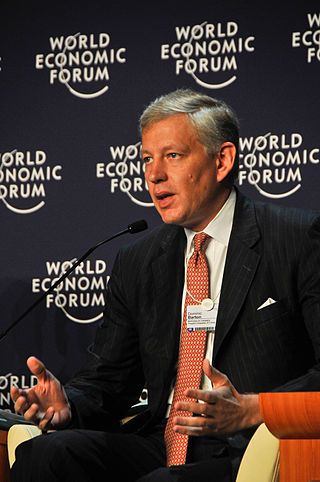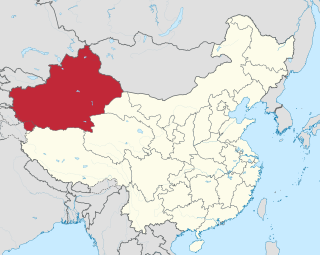Racism in Asia is multi-faceted and has roots in events that have happened from centuries ago to the present. Racism in Asia may occur from nation against nation, or within each nation's ethnic groups, or from region against region.
Racism in China arises from Chinese history, nationalism, sinicization, and other factors. Racism in the People's Republic of China has been documented in numerous situations. Ethnic tensions have led to numerous incidents in the country such as the Xinjiang conflict, the ongoing internment and state persecution of Uyghurs and other ethnic minorities, the 2010 Tibetan language protest, the 2020 Inner Mongolia protests, discrimination against Africans in particular and discrimination against Black people in general.

Canada–China relations, or Sino-Canadian relations, officially date back to 1942, when Canada sent an ambassador to China. Before then, Canada had been represented by the British ambassador. The Communist victory (1949) in the Chinese Civil War resulted a break in relations that lasted until 1970, when Canadian Prime Minister Pierre Trudeau became one of the first Western leaders to recognize the People's Republic of China.

Canada–South Korea relations are foreign relations between Canada and the Republic of Korea. Canadian soldiers participated in the defense of South Korea during the Korean War. Full diplomatic relations between Canada and South Korea were established on January 14, 1963. Canada has an embassy in Seoul, and a consulate in Busan. South Korea has an embassy in Ottawa and three Consulates-General, in Montreal, Toronto and Vancouver. Both nations are full members of APEC, OECD and the G20.

Dominic Barton, known as Bao Damin in China, is a Ugandan-born Canadian business executive, author, and diplomat. He is the current chairman of the private investment firm LeapFrog Investments as well as the chancellor of the University of Waterloo. He served as the Canadian Ambassador to the People's Republic of China from 2019 to 2021. Prior to this, Barton was the Global Managing Director of McKinsey & Company, the global consulting firm, from 2009 to 2018 and has previously served as Chairman of Teck Resources and as Non-Executive Director at the Singtel Group in Singapore and Investor AB in Sweden.

Victor Oh is a Canadian senator from Ontario. He was appointed to the Senate on January 25, 2013.

The Xinjiang conflict, also known as the East Turkistan conflict, Uyghur–Chinese conflict or Sino-East Turkistan conflict, is an ongoing ethnic geopolitical conflict in what is now China's far-northwest autonomous region of Xinjiang, also known as East Turkistan. It is centred around the Uyghurs, a Turkic ethnic group who constitute a plurality of the region's population.

Han Peng Dong is a Canadian politician who is serving as the member of parliament (MP) for Don Valley North. Sitting as an independent, Dong was elected to the House of Commons in 2019 as a member of the Liberal Party. He previously served as the member of provincial parliament (MPP) for Trinity—Spadina from 2014 to 2018, with the Ontario Liberal Party. In March 2023, Dong stepped down from the Liberal caucus amidst allegations that he advised the Chinese consul general in Toronto against the release of Michael Spavor and Michael Kovrig and helped the consulate interfere in the 2019 federal election.
The Independent Senators Group is a parliamentary group in the Senate of Canada. Established on March 10, 2016, the Independent Senators Group is committed to a non-partisan Senate and the modernization of the Upper House of Canada's Parliament. The Independent Senators Group is the largest parliamentary group in the Senate. Composed of independents not affiliated with any political caucus, members of the group work cooperatively but act independently.

Michael Peter Todd Spavor is a Canadian consultant who has worked extensively in North Korea. He is the director and founding member of Paektu Cultural Exchange, a NGO that facilitates sports, cultural, tourism and business exchanges involving North Korea.

Geng Shuang is a Chinese politician serving as China's Deputy Permanent Representative to the United Nations. He formerly served as the deputy director of the Information Department of the Ministry of Foreign Affairs.

The Xinjiang internment camps, officially called vocational education and training centers by the government of China, are internment camps operated by the government of Xinjiang and the Chinese Communist Party Provincial Standing Committee. Human Rights Watch says that they have been used to indoctrinate Uyghurs and other Muslims since 2017 as part of a "people's war on terror", a policy announced in 2014. The camps have been criticized by the governments of many countries and human rights organizations for alleged human rights abuses, including mistreatment, rape, and torture, with some of them alleging genocide. Some 40 countries around the world have called on China to respect the human rights of the Uyghur community, including countries such as Canada, Germany, Turkey and Japan. The governments of more than 35 countries have expressed support for China's government. Xinjiang internment camps have been described as "the most extreme example of China's inhumane policies against Uighurs".

The Xinjiang papers are a collection of more than 400 pages of internal Chinese government documents describing the government policy regarding Uyghur Muslims in the Xinjiang region. In November 2019, journalists Austin Ramzy and Chris Buckley at The New York Times broke the story that characterized the documents as "one of the most significant leaks of government papers from inside China's ruling Communist Party in decades." According to The New York Times, the documents were leaked by a source inside the Chinese Communist Party and include a breakdown of how China created and organized the Xinjiang internment camps.

The Chinese government is committing a series of ongoing human rights abuses against Uyghurs and other ethnic and religious minorities in Xinjiang that is often characterized as persecution or as genocide. Beginning in 2014, the Chinese government, under the administration of Chinese Communist Party (CCP) General Secretary Xi Jinping, incarcerated more than an estimated one million Turkic Muslims without any legal process in internment camps. Operations from 2016 to 2021 were led by Xinjiang CCP Secretary Chen Quanguo. It is the largest-scale detention of ethnic and religious minorities since World War II. The Chinese government began to wind down the camps in 2019. Amnesty International states that detainees have been increasingly transferred to the formal penal system.

Rushan Abbas is a Uyghur American activist and advocate from the Xinjiang Uyghur Autonomous Region in China. She is the founder and executive director of the nonprofit Campaign for Uyghurs. Abbas became one of the most prominent Uyghur voices in international activism following her sister's detainment by the Chinese government in 2018.

The Inter-Parliamentary Alliance on China (IPAC) is an international, cross-party alliance of parliamentarians from democratic countries focused on relations with the People's Republic of China (PRC), and specifically, the Chinese Communist Party (CCP). It was established on June 4, 2020, on the anniversary of the 1989 Tiananmen Square protests and massacre. The alliance comprises over 240 members from 27 legislatures and the European Parliament. Each legislature represented takes turns to chair the alliance on a rotating basis. Its purpose is to create a coordinated response to China on global trade, security and human rights.

In December 2018, Canadian nationals Michael Spavor and Michael Kovrig were taken into custody in China. It appeared that their detention on December 10 and subsequent indictment under the state secrets law were linked to the arrest of Huawei's chief financial officer, Meng Wanzhou, in Canada on December 1. In English-language media, the pair are frequently and colloquially referred to as the Two Michaels.

The foreign policy of Justin Trudeau is Canada's foreign policy since Justin Trudeau became Prime Minister in November 2015. Mélanie Joly has served as the Minister of Foreign Affairs since October 2021.

The Uyghur Tribunal was an independent "people's tribunal" based in the United Kingdom aiming to examine evidence regarding the ongoing human rights abuses against the Uyghur people by the Government of China and to evaluate whether the abuses constitute genocide under the Genocide Convention. The tribunal was chaired by Geoffrey Nice, the lead prosecutor in the trial of Slobodan Milošević, who announced the creation of the tribunal in September 2020.

The People's Republic of China made attempts to interfere in the 2019 Canadian federal election and 2021 Canadian federal election and threatened Canadian politicians, according to Canadian Security Intelligence Service (CSIS). In late 2022, the Global News television network reported on a suspected attempt by the PRC to infiltrate the Parliament of Canada by funding a network of candidates to run in the 2019 Canadian federal election. In early 2023, The Globe and Mail newspaper published a series of articles reporting that the CSIS, in several classified documents, advised that China's Ministry of State Security (MSS) and United Front Work Department had employed disinformation campaigns and undisclosed donations to support preferred candidates during the 2021 Canadian federal election, with the aim of ensuring that the Liberals would win again, but only with a minority. In February 2023, CSIS concluded that the Chinese government interfered in the 2019 and 2021 elections.
















